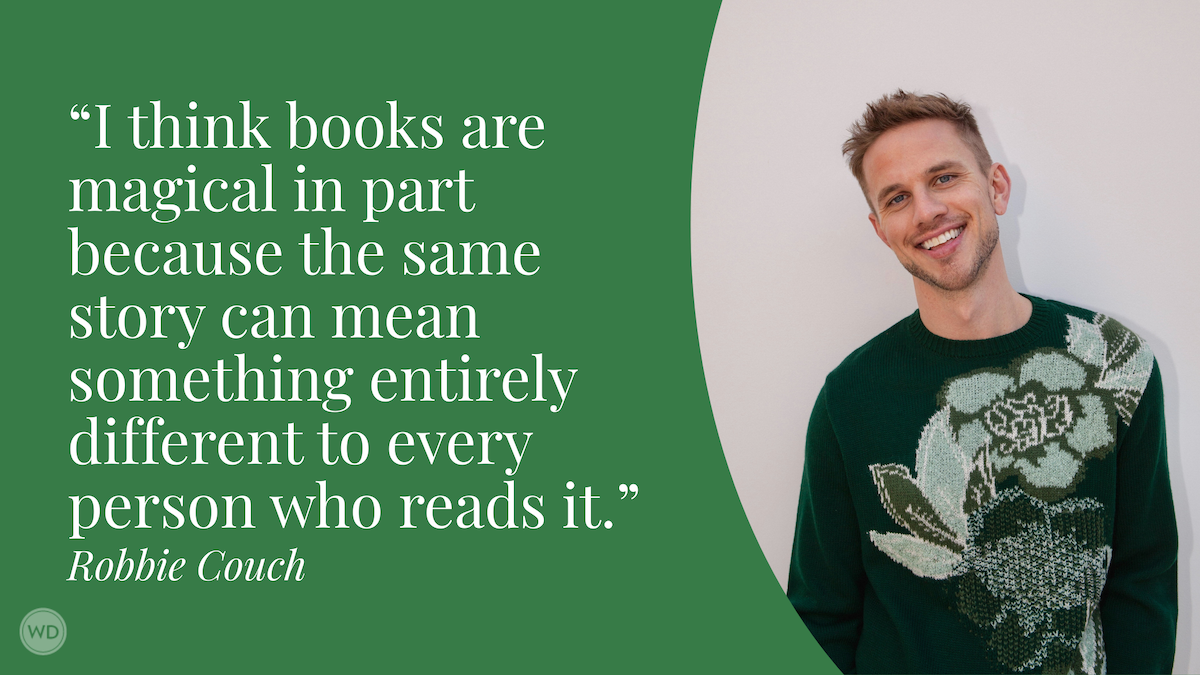Write It Your Way August Finalist – Honey and the Moon
Here is one of the five finalists for the Write It Your Way August competition. Read it now (and the other finalists) and vote by October 1 to help us pick a winner.
Here is one of the five finalists for the Write It Your Way August competition. Read it now (and the other finalists) and vote by October 1 to help us pick a winner. The theme for this Write It Your Way competition was "New Beginnings" and entrants were allowed to take that theme in any direction they liked.Click here for a list of upcoming Writer's Digest writing competitions.
She wakes slowly. There is nothing but the sensation of warmth on her skin.
Time passes. How much? How little? She doesn’t know. There’s something cool – a breeze, slowly easing over her. She becomes aware that she’s lying on firm earth. The breeze blows again, and she feels something – grass? – tickle her face.
The warmth defines itself into light. Sunlight. Radiating through her closed eyelids, painting the insides red.
She hears the gurgling of water as waves fold over themselves, lapping at the shore. She’s so warm. She doesn’t think.
Something fills her. Something easy. She remembers the word for it now – peace.
She doesn’t know how long she lies there. Days? Years? It feels like seconds and seems like eons.
She opens her eyes.
She’s lying between two trees. The grass is high all around her, and as it parts in the wind she catches glimpses of a vast lake at sunset. The sun is suspended low in the sky, with gold-rimmed clouds drifting across the horizon. Across the water, there are two cliffs opposing each other, with a channel between them. She guesses that it leads to the sea.
Closing her eyes, she drifts in and out of dreamless sleep. There’s nothing but this moment, and the next one, and the next.
Until – the shadow of a feeling. The trigger is a name she can’t remember, a body she can’t place. Life springs into her limbs, and as she stirs, she remembers her name.
With her name comes memory. Mother, surrounded by her garden. Father, reading her a book. She and her friends going to carnivals. Husband dancing with her on a beach. Daughter sitting patiently while she braided her hair. Son asking her approval of a girlfriend.
More. Graves of friends, family. Husband sinking into dementia. Son killed in combat. Daughter by her bedside, holding her hand, saying tearfully, “I’ll see you soon.”
Of course. She looks up at the sky, at the sun which hasn’t moved in all the years she’s been here. I’m dead, she thinks. Well, this isn’t so bad.
She gets to her feet. To her left, a sandy path winds through a wood of wide-spaced trees. This is very strange, she thinks. She tries to listen for the chirps of birds, the buzz of crickets, but hears nothing, save for the sound of the wind threading through the leaves. The complete silence unsettles her.
She thinks of all the people she’d like to find here. She looks around eagerly, pushing aside branches, peeping around trunks, expecting to see their eyes looking for her, too. She finds nothing.
Disappointed, she walks along the footpath. Strangely, in the trees, there are things that she recognizes. There’s a huge staircase, leading to nowhere. A block of morgue doors stands in a glen, ivy clinging to the metal. A tire swing hangs from a huge oak.
She realizes something: she’s not tired anymore. Gone is the feeling of lugging around a failing machine. Gone is the stiffness in her joints. Gone is the pain in her chest.
It seems everything else is gone too. When she makes to touch her face, she can’t feel anything. When she looks down she sees nothing.
She hits a tree, throws herself on the ground – when she falls, she floats. I don’t have a body, she thinks, and gives in to panic.
What did I do, what did I do, what did I do? She tries to speak but she has no voice. Is this some kind of hell? Anguished, she makes herself relive every wrong she had ever done: hit her children; let her friend drug herself to death; kissed the man that was not her husband. Humiliated classmates in the schoolyard, and later, cafeteria; alienated her father for years because of something he couldn’t control. And the other, greater sins, that were less definable into moments: greed, selfishness, cruelty.
Pride. Much of that, too much of that. The pettiness she’d had as a child, grown into snobbery. The people she’d hurt, the relationships she’d let die, because she wouldn’t admit she was wrong. Well, I admit to my faults now, even if it’s too late. Maybe whatever controls this place will take pity on me.
Something does ease, for she’s able think clearly again. It’s all you can do to keep walking, she says to herself. Taking a deep breath, she stands, and makes her way down the path again.
The woods reveal more sights: a collegiate courtyard, the smoking ruins of a bomb shelter. A gate between two trees; leading to what?
Something sounds, so suddenly that she stops in her tracks. Warily, she looks around, half expecting the Devil himself to leap out and grab her.
The sound resumes as she begins walking, and she looks down at tanned feet strong and smooth. She runs down the path, jumps around, twirls through the dusk. As soon as she thinks about what she’s doing, she’s laughing, harder and truer than she has in years. She’s still laughing quietly as she continues walking.
And then, the path ends in a T. To her right, the path leads to a weathered dock. Tethered to it is a small sailboat, bobbing in the water.
To her left is her home: her childhood home. Through the screen door, murmurs and the scent of cake baking waft out. She can hear the creak of a rocking chair and the sounds of children playing.
A hungry, powerful ache yawns inside of her. She smiles, even as tears spring to her eyes, and goes toward the door. No wonder she hasn’t seen anyone! They’re all in there, waiting for her.
She thinks of the boat, and she stops at the mailbox, looks back. Where would the boat have taken her?
Looking back at the house, she wavers. She wants nothing else but to run to that house, to greet all the people she knows are there. But are they? How can they be real if everything else in the wood comes from her memory?
She goes to the dock. She doesn’t remember this boat. She’s sure of it. Her house didn’t have a dock; and anyway, she’s never sailed on a boat like this.
As she comes near, its sail swells with a stiff wind, and the boat strains at the rope that anchors it to the dock.
She looks back at the house. The door is still invitingly open; the sound of laughter still entices her. It hurts to look away. She touches the dock, feels the rough wood beneath her fingers.
And then the sunlight recedes from the forest until only the dark outlines of trees remain. The golden light bleeds from the sky across the water, from the boat, through the two cliffs, and out to sea, stretching to the horizon. The prow of the boat turns so that it’s directly on the path.
Giddy with recklessness and the unknown, she climbs into the boat, sitting on the narrow bench. Reaching across, she pulls the rope up and over the dock, setting it on the seat beside her as the wind strengthens and guides her toward the sun.
Is this your favorite Write It Your Way Finalist? If so, vote here or on this post by commenting that it's your favorite.
Be sure to read the other finalists:
Cheerios and Coffee
The Shoes
New Year's Morning
Honey and the Moon
A Fine Pickle
Brian A. Klems is the former Senior Online Editor of Writer’s Digest, and author of Oh Boy, You’re Having a Girl (Adams Media/Simon & Schuster). Follow him on Twitter @BrianKlems.








